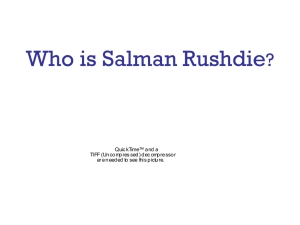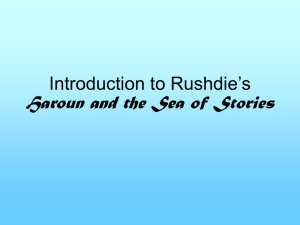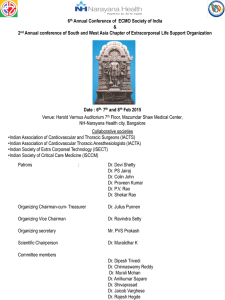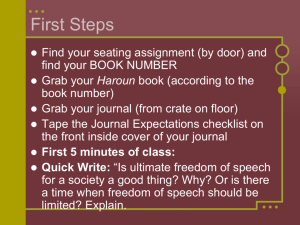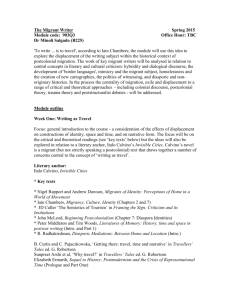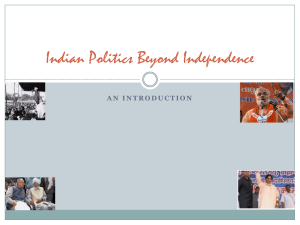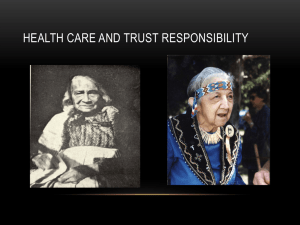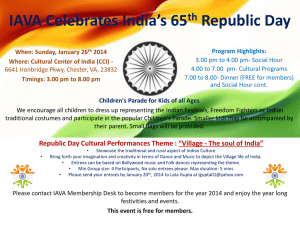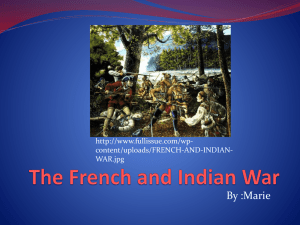From Classical to Contemporary - East
advertisement
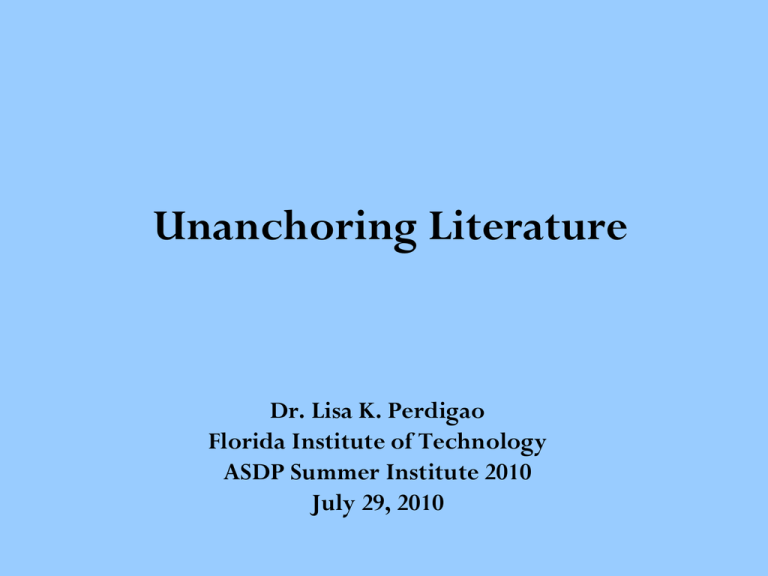
Unanchoring Literature Dr. Lisa K. Perdigao Florida Institute of Technology ASDP Summer Institute 2010 July 29, 2010 “In our modern, multicultural world, one that has become geographically unbound, perhaps literature too has become unanchored. It can only add a sense of rootlessness, as writers and books traverse the globe. Certainly the university departments of post-colonial literature are behind the times. We’ve moved beyond that. V. S. Naipaul has spoken of writing ‘from the periphery.’ But there is no longer a center against which the margin can be measured. And if there were, it would have to include Naipaul himself in his Wiltshire manor house.” --Monica Ali, “Did I Know Enough to Be British?” http://www.theatlantic.com/magazine/archive/2009/08/did-i-know-enough-to-bebritish/7538/ Redesigning Maps, Navigating Borders • Infusing South Asian studies into the Humanities curriculum • Re-examining how borders are drawn in Humanities courses, from survey courses to specialized topics • Conceptualizing South Asian studies: How do we decide which texts should be included? How do we map our courses? • Border crossing—as theme for a course and as an approach to the Humanities curriculum New Cartographies • From Western Civilization: World Civilization • Constructing World Literature • Creating minors in English, international studies • Expanding studies in literature: children’s and adolescent literature, postcolonial literature, comparative literature • Intersections: South Asian, Southeast Asian, Asian American, Latin American, Caribbean, African American, African, British, and American literatures “Border Crossing in World Literature” • Stories of space, displacement, and identity • Othering the self, self-fracturing, reconciliation • Development of identity within and between cultures, as insiders, outsiders, immigrants, exiles, and travelers • Journeys of the self articulated through the navigation of space; South Asia as exoticized, romanticized, idealized, nostalgicized, criticized • Homer’s Odyssey as nostos (homecoming) • The bildungsroman (coming-of-age story) vs. entwicklungsroman (story of development) Course Design 1. Unchartered Waters: Creating the Self and the World 2. Drawing Borders: Insiders and Outsiders 3. Circumnavigation: Narrating the Self and/as Text 4. Castaways: Self in/as Exile 1. Unchartered Waters • Martel, Yann, Life of Pi (2001): odyssey at sea, attempt at homecoming; struggles with idea of India, of faith (Hinduism, Christianity, Islam); significance of storytelling; Spanish/Canadian writer • Rushdie, Salman, Haroun and the Sea of Stories (1990): odyssey of/through father’s stories; significance of storytelling as he “saves the world of makebelieve” • Tarsem’s film The Fall (2006): Los Angeles, 1915, American stuntman telling story to young Romanian girl; envisions an “Indian”; exoticizing India, storytelling; Jaidpur, Jodhpur, the blue city http://rogerebert.suntimes.com/apps/pbcs.dll/article?AID=/20080603/PEOPLE /868926055/1023 2. Drawing Borders • Roy, Arundhati, The God of Small Things (1997): twins struggling with identity; separation, displacement, and reconciliation; magical realism; family’s history • Ghosh, Amitav, The Shadow Lines (1988): boy growing up, moving from Calcutta to Delhi to London; telling story of life through 20th century; Bengali and English families; borderlands with partition • Danny Boyle and Loveleen Tandan’s film Slumdog Millionaire (2008): orphan from Mumbai; importance of narrative, retelling story of life • Gurinda Chadra’s film Bend It Like Beckham (2002): Punjabi girl living in London wanting to play professional football; Beckham as god; struggle between tradition and modernity; identity politics mapped along lines of race, class, gender • Rakeysh Omprakash Mehra’s film Delhi-6 (2009): American/Indian, Hindu/Muslim identities—clips with New York meets Delhi, Indian Idol • Mishra, Pankaj, The Romantics (2000): expatriates in India; twenty year old Brahmin narrator is torn between East and West, trying to understand Western tradition 3. Circumnavigation • Narayan, R. K., The Vendor of Sweets (1967): Jagan reading the Bhagavad Gita; novel-writing machine; technology versus creation; modern versus traditional India; rereading the literary tradition • Tharoor, Shashi, The Great Indian Novel (1989): retelling of the Mahabharata; play with colonialism in retelling master narratives • Gilbert, Elizabeth, Eat, Pray, Love: One Woman’s Search for Everything Across Italy, India and Indonesia (2006): spiritual quest to find self; American conception of India, attempt to find meaning 4. Castaways • Naipaul, V. S. The Mimic Men (1967): writer living in London returns home; tension between being Indian/Caribbean/English; idealization versus disillusionment in representation of India • Rushdie, Salman, Fury (2002): professor leaves family in London to live in America; disillusionment with three worlds, India, England, America, his own history Mapping other Humanities courses • Children’s and Adolescent Literature: Martel’s Life of Pi, Rushdie’s Haroun and the Sea of Stories, J. M. Barrie’s Peter Pan, Lewis Carroll’s Alice’s Adventures in Wonderland, L. Frank Baum’s The Wonderful Wizard of Oz, Katherine Paterson’s Bridge to Terabithia, Rodman Philbrick’s The Last Book in the Universe, Francesca Lia Block’s I Was a Teenage Fairy, Cornelia Funke’s Inkheart • Magical Realism: Martel’s Life of Pi, Rushdie’s Haroun and the Sea of Stories, Roy’s The God of Small Things, Rushdie’s Midnight’s Children, Gabriel Garcia Márquez’s One Hundred Years of Solitude, Ngugi wa Thiong’o’s Wizard of the Crow, Toni Morrison’s Beloved, Erna Brodber’s Louisiana • Comparative Literature (connections for survey courses, postcolonial literature): Joseph Conrad’s Heart of Darkness, Chinua Achebe’s Things Fall Apart, and Pramoedya Ananta Toer’s House of Glass; Alice Walker’s Possessing the Secret of Joy and Ngugi’s The River Between; Homer’s Odyssey, James Joyce’s Ulysses, and Derek Walcott’s Omeros; the Mahabharata and Tharoor’s The Great Indian Novel; Bhagavad Gita and Nayaran’s The Vendor of Sweets • Diasporic: Morrison’s Beloved, Charles Johnson’s The Middle Passage, Walker’s Possessing the Secret of Joy, Roy’s The God of Small Things, Mishra’s The Romantics, Rushdie’s Fury, Naipaul’s The Mimic Men, Maxine Hong Kingston’s The Woman Warrior: Memoirs of a Girlhood Among Ghosts, Amy Tan’s The Joy Luck Club Infusing Sources • • • • • • • • Ashcroft, Bill, and Garesh Griffith, The Empire Writes Back: Theory and Practice in Post-Colonial Literature (Routledge, 2002) Discusses Naipaul’s The Mimic Men and Narayan’s The Vendor of Sweets Appadurai, Arjun, Modernity at Large: Cultural Dimensions of Globalization (U of Minnesota P, 1996) Ball, John Clement, Imagining London: Postcolonial Fiction and the Transnational Metropolis (U of Toronto P, 2004) Chapter: “London South-East: Metropolitan (Un)realities in Indian Fiction”: Rushdie, The Mimic Men, The God of Small Things Bhabha, Homi K., Nation and Narration (Routledge, 1990) ----, The Location of Culture (Routledge, 1994) Gokulsing, K. Moti, and Wimal Dissanayake, Popular Culture in Globalised India (Routledge, 2009) Chapter: Lothspeich, Pamela,“The Mahabharata’s Imprint on Contemporary Literature and Film” Kumar, Amitava, ed., Away: The Indian Writer as an Expatriate (Routledge, 2004) Essays by Rushdie, Ghosh, Narayan, Naipaul, and Mishra ----, Bombay—London—New York (Routledge 2002) Mishra, Vijay, The Literature of the Indian Diaspora: Theorizing the Diasporic Imaginary (Routledge, 2007) Nasta, Susheila, Home Truths: Fictions of the South Asian Diaspora in Britain (Palgrave Macmillan, 2004): idea of “Asian” Britain • • • • Nelson, Emmanuel S., Reworlding: The Literature of the Indian Diaspora (Greenwood, 1992) Ranasinha, Ruvani, South Asian Writers in Twentieth-Century Britain: Culture in Translation (Oxford UP, 2007) Singh, Amritjit, and Peter Schmidt, Postcolonial Theory and the United States: Race, Ethnicity, and Literature (U Press of Mississippi, 2000) Introduction: “On the Borders between US Studies and Postcolonial Theory” Williams, Patrick, and Laura Chrisman, Colonial Discourse/Post-Colonial Theory (Columbia UP, 1994)
